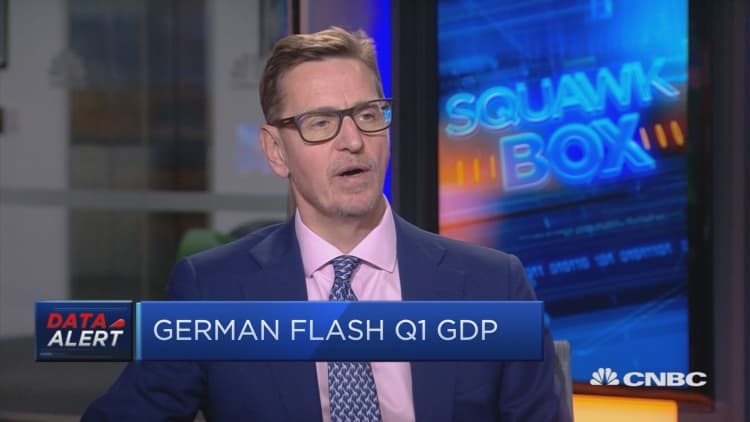Germany's automotive sector could fall as much as 12% over "three bad trading days," if President Donald Trump imposes tariffs on European car manufacturers, one analyst told CNBC.
Trump has until Friday midnight (Washington time) to decide whether to impose duties on car imports. This would likely hurt Germany, the EU's traditional growth engine, given that it is one of the largest direct car exporters to the U.S.
The German stock market could fall as much as 6% and its automobile and components sector, specifically, could see losses of up to 12%, according to Christoph Schon, executive director of Axioma, a risk management solutions provider. He told CNBC over the phone that the losses could happen over a period of three trading days, or over five to 10 sessions.
Germany's DAX is up by about 14% so far this year, while the overall European auto sector is higher by about 11% this year. Volkswagen and Daimler are up by around 7% and 15%, respectively.
Trump threatened to impose 20% tariffs on European cars back in 2018, arguing there's a trade imbalance threatening the U.S.'s national security. The EU is the largest exporter of motor vehicles in the world, whereas the United States is the largest importer.

"Germany is the tail on the U.S.-China trade war dog and at the end of the day, 47% of GDP (gross domestic product) from Germany is exports — the majority of that going to those two trading partners. If they blow up in a trade war, Germany is probably the place that gets hits worse," Mark Phelps, chief investment officer at AllianceBernstein. told CNBC's "Squawk Box Europe" Wednesday.
The EU has made every effort to ensure these tariffs are avoided. European Commission President Jean-Claude Juncker traveled to the U.S. last year and agreed with Trump to work together to bring existing tariffs toward zero on non-auto industrial goods; to buy more liquefied natural gas from the U.S. and to find ways to bring their standards closer together.
In any case, the impact on sentiment would be worse than the actual direct impact from the tariffs.Florian HenseEuropean economist at Berenberg bank
However, both sides have not yet started discussing a trade deal. The ongoing escalation in tensions between China and the U.S. has created more jitters in Europe, with analysts expecting Trump to keep a strong stance against the EU too.
"If indeed we get U.S. car tariffs on imports from the euro zone — not just their announcement, you could forget our economic forecasts completely. No chance of a sustained pick-up in activity throughout the second half as we expect," Florian Hense, European economist at Berenberg bank, told CNBC via email.
The euro zone economy has lost steam recently, with weaker manufacturing and growth data. The European Central Bank (ECB) even had to cut its growth projections for the year back in March. Growth in the EU is highly sensitive to external shocks, due to its export-driven economy.
"The euro zone growth engine has lost a lot of cyclical velocity in the past year, exposing vulnerabilities to slower Chinese growth, weaker global trade and structural problems in the German auto sector. The fear is that we are just one shock away from a recession," Lena Komileva, chief economist at G+Economics, told CNBC via email.
Some analysts believe Trump could decide this week to postpone its decision on car tariffs and focus on the ongoing talks with China instead.
"For the time being Trump will probably be busy with China and choose to extend Saturday's deadline (European time) before escalating the conflict with the EU over cars and car imports," Hense told CNBC.
"In any case, the impact on sentiment would be worse than the actual direct impact from the tariffs," he added.



